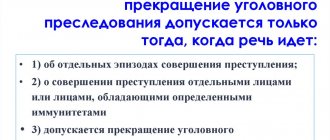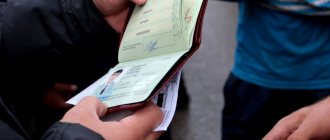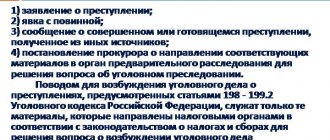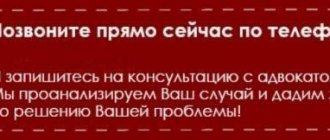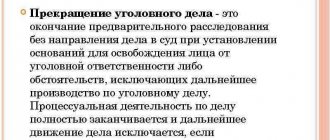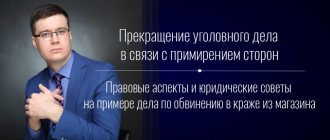Resumption of a criminal case based on newly discovered circumstances under Art.
413 of the Code of Criminal Procedure of the Russian Federation - confirmation of the availability of judicial protection in the country, the right to an unbiased, competent administration of justice. The purpose of reopening a case is to ensure an error-free decision is made. Applies when all possibilities to challenge the decision have been exhausted. Legal proceedings statistics indicate that a small number of citizens took advantage of this opportunity. Multi-channel free hotline Legal advice on criminal law. Every day from 9.00 to 21.00
Moscow and region: +7 (495) 662-44-36
St. Petersburg: +7 (812) 449-43-40
Special stage
In 2016, 965,000 criminal cases were examined, of which:
- 772,556 indictments were issued.
- 4,658 people were rehabilitated.
- 240,000 cases were terminated for various reasons.
- The share of cases sent for review in accordance with Art. 413 Code of Criminal Procedure amounted to 6%.
There are several reasons for this statistics. The main one is a lack of self-confidence.
The legislator has provided for the possibility of appealing the final decision if evidence of its illegality arises. Correction of errors is possible when the proceedings are resumed according to the rules and grounds of Chapter 49 of the Criminal Procedure Code.
The Code of Criminal Procedure contains conditions that must be met when reopening a case:
- the unjust decision came into force;
- the presence of circumstances has been revealed that prove the commission of a crime by an interested party in relation to the convicted person;
- other judicial acts were received proving the illegality of the court decision.
What circumstances should be classified as new? Which ones are considered newly identified? You will find answers to these questions in this article.
The emergence of the worst turn
Reading out the verdict
When the ruling made by the court is reviewed under all the conditions provided for this, the judges are faced with the question: how to carry out everything correctly, ensure the preservation of the rights of the accused, prevent him from going through all rounds of criminal prosecution for the same actions again and not worsen the sentence .
On this basis, the time limits within which the decision can be reviewed become important.
Moreover, if data has appeared that can favorably influence the fate of the convicted person, then there are no deadlines.
It is possible to review a criminal case with facts that justify the sentenced person even after his death. When, on the contrary, the information worsens the situation of the sentenced person, the circumstances can be provided within one year, counting from the time of their discovery.
Opening a case based on newly identified circumstances
The resumption of a criminal case based on newly discovered circumstances is initiated if there is evidence of the innocence of the convicted person.
Such evidence includes:
- A special stage of the proceedings is used in exceptional cases in the same composition of participants. A verdict to a participant in the case under review, proving the illegality of actions in relation to the convicted person. It has been proven that the false testimony of a witness or victim led to the conviction of an innocent person. The expert's false opinion influenced the judge's conclusions.
- An indictment against a person investigating a crime in a contested case. Criminal acts and his personal interest in the result have been proven.
- A verdict that proves the criminal activity of a judge at a trial in a contested case.
The verdict must convict a specific person of a crime who has intent towards the convicted person and justice. The right to make a decision belongs to the prosecutor.
The death of the culprit will not allow a verdict to be received as conclusive evidence. In such cases, the day of the emergence of newly discovered circumstances is considered to be the date of the decision to terminate the criminal prosecution. Reconciliation when the criminal case is reopened is impossible.
Violations committed during the consideration and appeal of the case, which cannot be attributed to newly discovered circumstances:
- the absence of an interpreter at the hearing when the defendant needed his services;
- improper notification of a person participating in the process;
- absence of a defense lawyer in legal proceedings;
- absence of the accused at court hearings;
- the decision is not signed by the judge;
- there is no minutes of the meeting;
- inability for the defendant to participate in the debate;
- presence of inadmissible evidence;
- misinterpretation of the law;
- other circumstances.
The violations listed above can only be appealed through the appellate, cassation and supervisory procedures. The right to decide to reopen a case belongs to the prosecutor, with the exception of review based on decisions of the ECHR and the Constitutional Court.
The prosecutor, having received a message from interested citizens and authorized persons, orders an inspection. The decision to initiate or refuse proceedings is formalized by a resolution. The prosecutor's positive conclusion is sent along with the materials to the court, which issues a judicial act.
The court may make one of the following decisions:
- Cancel the judicial act and transfer the material for a new trial.
- Cancel the illegal decision, stop the criminal prosecution.
- Reject the prosecutor's conclusion.
Citizens who have received a refusal decision have the right to appeal it to a higher court.
On what grounds is production resumed?
There are moments for a criminal, a participant in a crime, when a sentence is passed, the period of its legal force has begun, but the judge was not aware of this, these include:
- false testimony
- forgery of evidence, investigative and judicial documentation
- crime in the actions of interrogators, investigators, prosecutors during the investigation
- the judge made mistakes during the trial
The last paragraph considers that there are no unknown circumstances for the judge, but there may be unknown facts for justice. The other grounds listed are essential points that serve as reasons for reviewing a criminal case, if they are capable of influencing the verdict.
When such data is not taken into account, the existence of such a judicial act is considered illegal. These new facts must be proven and established in court or by an investigator who terminated the criminal case in connection with an amnesty or pardon.
Of course, doubts alone do not serve to recognize incorrect expert or other procedural actions.
Such restrictions pose a practical problem. For example, a criminal procedure may stop due to missing witnesses or experts hiding from investigative actions. To initiate reviews of cases under certain conditions, it is necessary to initiate criminal proceedings against people who have violated the law.
When there is a court decision in force and with all applications recognized as reliable, it will be very difficult to prove the opposite. But restrictions are necessary, otherwise there would be constant re-evaluation of actual data on long-closed cases.
Review of judicial practice
The Moscow District Court considered the criminal case of defendant R.R. Levitsky, accused of fraud Art. 159 of the Criminal Code of the Russian Federation. The conclusion of an expert - an employee of the expert service at the Ministry of Internal Affairs - served as the main evidence of the commission of a crime. At the trial stage, the defendant chose the position of independent defense, thereby depriving himself of a fair trial and a just decision. The lawyer-consultant appointed by the court took the position of an outside observer. An independent appeal of the final decision to higher authorities also did not produce results.
Then the relatives of the convicted person turned to a lawyer by agreement. During his work, the defense attorney proved criminal activity and the expert’s interest in the outcome of the case. A criminal case was initiated and a verdict was passed. Case of R.R. Levitsky was reconsidered due to newly discovered circumstances, and a decision was made to terminate the criminal prosecution.
Citizen A.S. Shestakova was convicted under Part 4 of Art. 159 of the Criminal Code of the Russian Federation, fraud. The verdict was appealed in the appellate and cassation instances, but the courts found no violations and left the judicial act unchanged. Criminal case and verdict against the alleged victim P.N. Dolgov proved the presence of intent - false testimony against A.S. Shestakova. In connection with newly discovered circumstances, the case was reconsidered, A.S. Shestakova has been rehabilitated.
Citizen N.P. Samoilov was convicted under Part 4 of Art. 228.1 of the Criminal Code of the Russian Federation. The verdict was appealed by the lawyer in higher courts, and was left unchanged. The convict filed an application to initiate a criminal case against the operational officers and the investigator, who, during the provocation, planted drugs in his car. The investigator and operatives confessed to the crime committed, and a verdict was passed. The review of the case allowed N.P. Samoilov to rehabilitate himself.
Competent actions of the defense attorney are important when making a legal decision. Independent appeal, lack of knowledge of criminal law, nuances when identifying other circumstances leads to a negative result. A criminal case cannot be reviewed in accordance with Art. 413 of the Code of Criminal Procedure of the Russian Federation, for newly discovered circumstances, if the judicial investigation was carried out in a special manner. Admitting guilt in the investigation or in court will not allow you to appeal an unlawful decision.
From practice. Citizen R.B. Anelina was sentenced by the court for a crime under Art. 228.1. The case in court was considered in a special manner, with the consent of the defendant. After two years, the investigator leading the investigation was convicted of a crime committed against R.B. Anelina. A judicial act issued under a special procedure did not allow the convicted person to apply for rehabilitation.
The defense lawyer must thoroughly study the materials of the criminal case, identify shortcomings in the investigation, and seek a review. Knowledge of the law and experience will allow justice to take place and get the desired result.
Commentary on Article 413 of the Code of Criminal Procedure of the Russian Federation
1. Newly discovered circumstances are circumstances indicating the depravity of the grounds of the court decision, which is associated with criminal abuses by participants in the proceedings, unknown to justice at the time of the court decision. These circumstances include (part 3 of the article):
1) the deliberate falsity of the testimony of a victim or witness, expert opinion, as well as the forgery of material evidence, protocols of investigative and judicial actions and other documents, established by a court verdict that has entered into legal force, or the deliberate incorrectness of the translation, which entailed the adoption of an illegal, unfounded or unfair sentence, illegal or unjustified determination or ruling;
2) criminal actions of the inquirer, investigator or prosecutor established by a court verdict that has entered into legal force, which resulted in the issuance of an illegal, unfounded or unjust sentence, the issuance of an illegal or unjustified ruling or resolution;
3) the criminal actions of the judge, established by a court verdict that has entered into legal force, committed by him during the consideration of this criminal case.
All of these circumstances can be established not only by a court verdict, but also by a court ruling or resolution, a decision of a prosecutor, investigator or investigator to terminate a criminal case on the following non-rehabilitative grounds: due to the expiration of the statute of limitations, as a result of an amnesty act or an act of pardon, in connection with death the accused or the person’s failure to reach the age at which criminal liability begins (Part 5 of Article 413).
The named abuses of the participants in the process must already exist at the time of the court decision, but become grounds for the resumption of criminal proceedings only after they are recognized as such by a court verdict or a decision to terminate the case on non-rehabilitative grounds. The first two groups of grounds differ in that abuses by participants in the process entail harmful consequences in the form of an unjust judicial decision. For the existence of a third ground, it does not matter whether it resulted in an incorrect judicial decision, or whether this decision is essentially correct - it is sufficient to establish any criminal abuses of the judge committed by him in connection with the consideration of this criminal case. Regardless of its substantive correctness or incorrectness, such a decision is considered illegal and vicious.
Newly discovered circumstances make it possible to reconsider it not only in favor, but also against the interests of the accused. The deterioration of the position of the accused is possible here because the burden of unfavorable consequences of failure to prove the indictment is removed from the prosecution, because it is revealed that, due to criminally hidden and therefore practically impossible to be known to it (and, consequently, the court) circumstances, it was placed in an unequal position in the trial and unfair conditions. The burden of the adverse consequences of failure to prove a true accusation should be lifted from the prosecution as a whole, even in the case where the unfairness of the court decision was the result of the abuses of the inquirer, investigator or prosecutor themselves (clause 2 of part 3 of the article), because they supported the accusation from name of the state and it was it, as the original subject of the accusation, that was infringed in its rights by their criminal actions.
2. Due to the fact that newly discovered circumstances should not be known to the court that made the decision being reviewed, the question arises: how can a judge who, for example, single-handedly considered a criminal case and himself committed a crime against justice (clause 3 of part 3), could he not have known about his own criminal actions? But if he knew about them, then according to the literal content of paragraph 1 of part 2 of this article, the newly discovered circumstance does not exist? Obviously, not only circumstances unknown to the court at the time the revised decision was made or its entry into force should be considered newly discovered, but also, although known to the court, they were hidden by it for the reasons indicated above. Although the court that committed criminal abuses in the case could not have been unaware of them, this nevertheless creates a newly discovered circumstance, since it can be considered (presumed) that it was not known to justice.
3. New circumstances, according to the literal content of paragraph 2, part 2, com. Articles are circumstances unknown to the court at the time of the court decision, indicating the illegality or groundlessness (erroneousness) of the sentence or other court decision on the merits and “eliminating the criminality and punishability of the act,” i.e. requiring improvement of the situation of the accused. It should, however, be borne in mind that by the Resolution of the Constitutional Court of the Russian Federation the provisions of clause 2, part 2 and part 3 of Art. 413 and art. 418 - in the part in which they allow refusing to resume proceedings in a criminal case and review the decisions taken on it if new factual circumstances arise that indicate the presence in the actions of the accused of signs of a more serious crime <1>.
——————————— <1> See: Resolution of the Constitutional Court of the Russian Federation of May 16, 2007 N 6-P in the case of verifying the constitutionality of the provisions of Articles 237, 413 and 418 of the Code of Criminal Procedure of the Russian Federation in connection with the request of the Presidium of the Kurgan Regional Court // RG. 06/02/2007. N 117.
4. Unlike newly discovered circumstances, new circumstances do not indicate the depravity of the judicial decision in the sense that they are not related to anyone’s criminal abuses.
New circumstances can be divided into two categories:
1) legal, that is, those that are associated with court errors in applying the rules of law (clauses 1, 2, part 4 of the article). In contrast to judicial errors, which are cassation and supervisory grounds for reviewing decisions, these errors are expressed in the incorrect application not only and not so much of the norms of the Criminal Code of the Russian Federation or the Code of Criminal Procedure, but rather the norms of constitutional and international law, in which judges of courts of general jurisdiction may sometimes not be so knowledgeable. New legal circumstances include:
— recognition by the Constitutional Court of the Russian Federation of the law applied by the court in this criminal case as inconsistent with the Constitution of the Russian Federation;
— a violation of the provisions of the Convention for the Protection of Human Rights and Fundamental Freedoms established by the European Court of Human Rights during the consideration of a criminal case by a court of the Russian Federation, which is related to:
a) using a federal law that does not comply with the provisions of the Convention for the Protection of Human Rights and Fundamental Freedoms;
b) with other violations of the provisions of the Convention for the Protection of Human Rights and Fundamental Freedoms;
2) factual or other new circumstances that indicate a significant incompleteness of the investigation of the circumstances of the criminal case by the parties and the court. It should be borne in mind that this basis requires the collection of new evidence in the case, because in comparison with the supervisory and cassation grounds they were more deeply hidden from the attention of the court. If the grounds for reviewing a court decision arise from the already existing materials of the case, a cassation or supervisory procedure for their consideration is, as a rule, allowed. Before the court decision enters into legal force, new circumstances are taken into account when making a decision by the appellate court.
From the contents of paragraph 1 part 4 com. Article does not yet follow that the review due to such a new circumstance as the recognition by the Constitutional Court of the Russian Federation of the law applied by the court in a given criminal case as inconsistent with the Constitution of the Russian Federation applies only to participants in constitutional proceedings, i.e. persons upon whose complaint the Constitutional Court of the Russian Federation declared the norm unconstitutional. The resumption of criminal proceedings due to this new circumstance in relation to persons who were not participants in constitutional proceedings, but in respect of whom law enforcement decisions were also made based on recognized unconstitutional norms, is also not excluded <1>.
——————————— <1> Definition of the Constitutional Court of the Russian Federation dated February 10, 2009 N 286-О-О.
5. The Constitutional Court of the Russian Federation recognized such a feature of newly discovered circumstances as the fact that they were unknown to the court when rendering a sentence or ruling (clause 4, part 2, article 384 of the Code of Criminal Procedure) as inconsistent with the Constitution. The essence of the question was that if the supervisory authority missed a judicial error, which could have been objectively learned from the case materials, then this circumstance can no longer be classified as unknown to the court and, therefore, considered newly discovered or new. Therefore, if such a fact became clear after consideration of the case by way of supervision by the last judicial instance of the country - the Presidium of the RF Armed Forces, then, due to newly discovered circumstances, such a case could no longer be accepted for proceedings by the Presidium. As a result, the mistake remained uncorrected, and the right of citizens to judicial protection remained unrealized. Thus, the Constitutional Court associates its decision mainly with the inability to reuse the supervisory procedure for reviewing a court decision to eliminate an error missed by the Presidium of the RF Supreme Court: “An analysis of the current legislation shows that, in contrast to strict regulation, which prevents the highest court from reconsidering a case in supervisory procedure, the procedure provided for in Articles 384 - 390 of the Code of Criminal Procedure of the RSFSR (now Articles 413 - 419 of the Code of Criminal Procedure of the Russian Federation - A.S.) could provide citizens with the necessary protection of their rights infringed as a result of a miscarriage of justice. However, this is prevented by the limitation of the range of grounds for reopening cases arising from paragraph 4 of part two of Article 384 of the Code of Criminal Procedure of the RSFSR (now part 2 of Article 413 of the Code of Criminal Procedure of the Russian Federation - A.S.), which does not meet the constitutionally proclaimed requirements of state protection of rights and freedoms.” This, in our opinion, means that such a sign of newly discovered (and new) circumstances as their unknownness to the court when making a decision should not be taken into account only when reviewing the decisions of the Presidium of the Supreme Court of the Russian Federation based on new or newly discovered circumstances by this very authority. Otherwise, it may lead to an undesirable blurring of the line between the supervisory procedure for reviewing court decisions and review based on new and newly discovered circumstances. It is significant that the Plenum of the Supreme Court of the Russian Federation explained that “review of a court decision by way of supervision is allowed only if there are legal grounds provided for in Articles 379, 409 of the Code of Criminal Procedure of the Russian Federation. If doubts about the legality, validity and fairness of a court decision are related to circumstances that were not known to the court (emphasis added by the author - A.S.) and discovered after the relevant verdict, ruling and court decision entered into legal force, the question of reviewing such a decision may be permitted only in the manner established by Chapter 49 of the Code of Criminal Procedure of the Russian Federation" <2>.
——————————— <1> See: Resolution of the Constitutional Court of the Russian Federation dated 02.02.1996 N 4-P in the case of verifying the constitutionality of paragraph 5 of the second part of Article 371, part three of Article 374 and paragraph 4 of the second part of the article 384 of the Criminal Procedure Code of the RSFSR in connection with complaints from gr. K.M. Kulneva, V.S. Lalueva, Yu.V. Lukashova and I.P. Serebrennikova // Northwestern Russian Federation. 02/12/1996. N 7. Art. 701. <2> See: paragraph 22 of the Resolution of the PVS of the Russian Federation dated January 11, 2007 N 1 “On the application by courts of the norms of Chapter 48 of the Criminal Procedure Code of the Russian Federation, regulating proceedings in the supervisory authority.”
6. According to the position of the Constitutional Court of the Russian Federation, “...the basis for the resumption of proceedings due to new or newly discovered circumstances cannot be the unfairness of the decisions made in the case, if it was the result of a judicial error, including confirmed by additional evidence identified after the verdict entered into legal force ( highlighted by the author - A.S.), confirming the innocence or lesser guilt of the convicted person" <1>. Another Resolution of the Constitutional Court of the Russian Federation confirms this position: “By resuming proceedings in a criminal case due to new or newly discovered circumstances, the court does not ensure that the shortcomings of the accusatory and judicial activities are made up, but the opportunity to study those factual circumstances that the criminal law recognizes as significant for determining the grounds and limits criminal legal protection, but which, due to objective reasons, could not previously be included in the subject of research (emphasized by the author - A.S.) in a criminal case" <1>. We cannot agree with this interpretation for the following reasons. As we noted above (see paragraph 3 of this article), the so-called. other new circumstances (i.e. factual) are nothing more than the circumstances of the criminal case, unknown to the court when making a judicial decision due to incompleteness of evidence, i.e. their unknownness to the court is still the result of shortcomings in judicial investigative activities. New circumstances are not newly discovered, i.e. they were not completely hidden before and are new to the court only because it failed to discover them in time (for example, due to the self-incrimination of the convicted person, slander by other defendants, etc.). The criterion for distinguishing them from supervisory grounds is that these circumstances unknown to the court must be revealed precisely by collecting new evidence, because Compared to supervisory ones, they are more deeply hidden from the attention of the court (they did not arise directly from the case materials available to the court).
——————————— <1> Determination of the Constitutional Court of the Russian Federation dated July 10, 2003 on the complaint of gr. I.S. Hvorostovsky for violation of his constitutional rights, Part 2 of Art. 413 and art. 417 Code of Criminal Procedure of the Russian Federation // RG. 10/14/2003. N 206. <2> See: Resolution of the Constitutional Court of the Russian Federation of May 16, 2007 N 6-P in the case of verifying the constitutionality of the provisions of Articles 237, 413 and 418 of the Code of Criminal Procedure of the Russian Federation in connection with the request of the Presidium of the Kurgan Regional Court // RG. 06/02/2007. N 117.
However, with regard to not only factual, but also new legal and even most newly discovered circumstances, it is impossible, in our opinion, to say that they cannot be the result of a miscarriage of justice. So, for example, if the court applied a norm of federal law that does not comply with the provisions of the Convention for the Protection of Human Rights and Fundamental Freedoms (Clause 2, Part 4, Article 413 of the Code of Criminal Procedure), then it thereby violated Part 3 of Art. 1 of the Code of Criminal Procedure of the Russian Federation, which reads: “If an international treaty of the Russian Federation establishes rules other than those provided for by this Code, then the rules of the international treaty apply,” i.e. made a grave miscarriage of justice! What, if not a miscarriage of justice, is an unlawful verdict based on deliberately false testimony of a witness and a victim (clause 1, part 3, article 413)? After all, if, as the Constitutional Court believes, in such cases there is no miscarriage of justice and the court that passed the sentence is not to blame for it (for circumstances unknown to the court “due to objective reasons could not previously be included in the subject of investigation”), then why is the sentence called illegal? ? Any illegal verdict is wrong.
The distinction between supervisory grounds, on the one hand, and newly discovered and new circumstances, on the other, should be carried out not according to the criterion of the presence or absence of the court’s guilt in an unjust decision (miscarriage of justice), but depending on the “depth of the circumstances” that were not accepted taken into account by the court or remaining unknown to him. Supervisory grounds follow from the available materials of the case and therefore seem to lie on the surface, and new and newly discovered circumstances require somewhat greater efforts to identify them - additional investigative actions or decisions of other judicial authorities. However, these efforts, in principle, could have been undertaken by the court itself, whose decision is being reviewed, if it had shown greater skill and high professionalism.
7. A decision to terminate proceedings initiated due to new or newly discovered circumstances may be made based on the results of an inspection or investigation of all circumstances that were indicated in the message as new or newly discovered <1>.
——————————— <1> See: Determination of the Investigative Committee of the Administrative Division of the Armed Forces of the Russian Federation dated February 21, 2007 N 25-D07-5 // BVS of the Russian Federation. 12/26/2007. N 12.
Appealing a judicial act when new circumstances arise
The justice system allows for the possibility of reviewing a sentence if new circumstances arise. They must be expressed in a dissenting opinion of independent arbitrators set out in the final award. Obtaining such a decision is an independent, time-consuming, but effective procedure. Subject to the competent work of a professional specializing in such matters.
Such circumstances include:
- Violations in the application of the law identified by the Constitutional Court, expressed in a separate judicial act.
- Decision of the ECtHR on the identified violation on the part of the authorized bodies.
- Judicial act of the European Court on the unlawful application of federal law.
- Other violations of human rights during the investigation of a crime.
- Availability of data on the commission of other crimes by the convicted person.
- The decision of an authorized person to close a criminal case after the statute of limitations has expired.
- Amnesty, pardon of a convicted person.
- Other factual circumstances.
A mandatory condition for resuming the consideration of the case is the presence of new material that is not related to the verdict.
Only those cases in connection with which complaints were filed are subject to review. The Chairman of the Supreme Court or his deputies have the right to make a decision on reconsideration, who, by their verdict, determine the future fate of the criminal case and schedule a court hearing. The case is reviewed by the Presidium of the RF Armed Forces.
Conditions for reopening a dismissed case in criminal proceedings
A criminal case previously terminated may be resumed. For this situation, the grounds for resumption of proceedings are regulated by Part 1 of Article 214 of the Code of Criminal Procedure. In order to reopen a terminated case, the decision to terminate it must itself be officially recognized as unfounded or illegal. An additional condition is that the statute of limitations, regulated for bringing the subject to proper criminal liability, has not yet passed (Part 3 of Article 214 of the Code of Criminal Procedure).
Illegality
A resolution is officially recognized as illegal if, when it was issued, the appropriate norms of the Criminal Code and the Code of Criminal Procedure were not observed. In order to resume a specific case due to the illegality of its termination, it is necessary to clarify the list of violated norms and confirm the very fact of their non-compliance.
Unfounded
Unreasonable termination is considered an ambiguous reason for resuming production. This is due to the evaluative nature of judgments about whether there has been a lack of adequate justification. As a rule, we can speak of groundlessness when the verdict to terminate the case was made subjectively by the investigative body. In such a situation, the investigator must not only refer to the law, but also justify the advisability of making a specific decision. Under such circumstances, a verdict that, for formal reasons, is considered correct (legal) may be recognized as unfounded.
Often, for example, doubts arise about the validity of termination if the proceedings are terminated by reconciliation of the parties, while the investigation did not have enough evidence of the involvement of the subject (accused, suspect) in the crime. The presence of such doubts allows us to raise the question of reopening this case, since the stated argument for its termination looks unconvincing, despite the observance of all required formalities.
The practice of reviewing cases based on an act of the Constitutional Court
Comments to Art. 413 of the Code of Criminal Procedure will not provide a complete understanding of the essence of the process when the case is resumed. Judicial practice will help to study the issue, which clearly proves the existence of a working mechanism that restores the rights of citizens. The main thing is to use this mechanism correctly and approach the issue of appeal correctly.
The essence of an appeal to the Constitutional Court of the Russian Federation is that the applicant must prove the unlawfulness of the courts’ application of a particular legislative norm.
An appeal to the Constitutional Court can be filed by any citizen whose interests are violated by a judicial act that has entered into force. Also, an appeal can be sent by a judge with a request to check whether the meaning of the application of a particular article of the law is constitutional. In this case, the process in a specific case is suspended until a response is received.
R.N. Toporkov was convicted under Art. 159 fraud, sentenced to a real sentence. The convicted person's lawyer filed a complaint with the Constitutional Court to verify the constitutionality of the law applied by the court. The Constitutional Court found that the applied norms of legislation did not correspond to their constitutional meaning, which violated the right of the convicted person to a fair sentence. The decision of the Constitutional Court was the basis for the resumption of the criminal case. The verdict against R.N. Toporkov was cancelled.
Let's look at an example. The victim in a criminal case is the citizen whose rights were violated by the crime: the owner of real estate, the heir, in the case of the murder of the owner. The lawyer defended citizen N.A. Polozov, convicted of fraud under Article 159 of the Criminal Code of the Russian Federation, where the victim in the case was recognized as a person who did not meet these criteria, but was interested in the result. The Constitutional Court found that the rule of law applied in a particular case did not correspond to the meaning intended by the legislator. The decision of the Constitutional Court was the basis for canceling the judicial act and obtaining an acquittal result.
